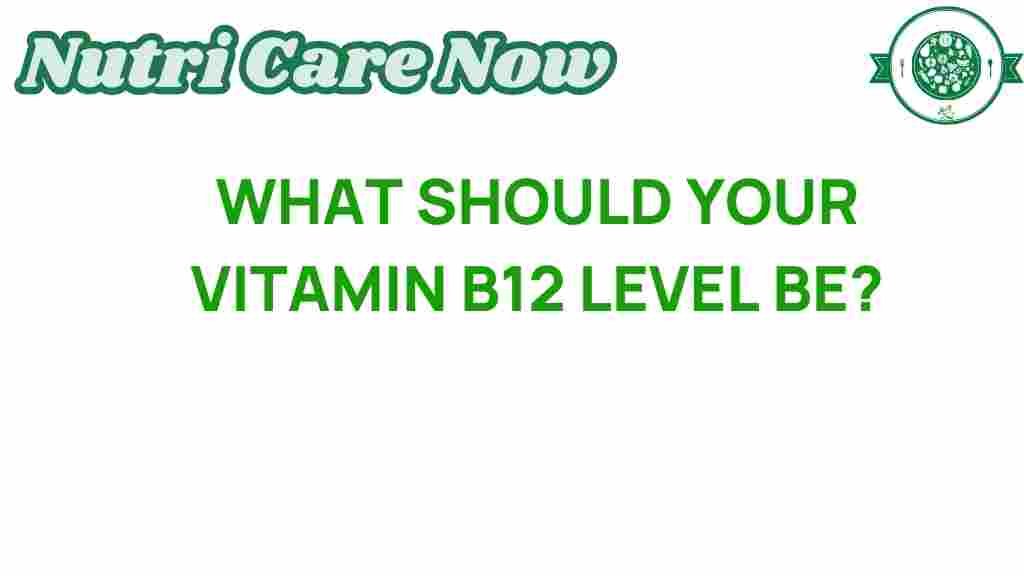Unveiling the Secrets of Optimal Vitamin B12 Levels
Vitamin B12, also known as cobalamin, is an essential nutrient that plays a crucial role in maintaining our overall health and well-being. This water-soluble vitamin is vital for various bodily functions, including the formation of red blood cells, DNA synthesis, and the maintenance of nerve cells. Unfortunately, many people around the world suffer from Vitamin B12 deficiency, which can lead to a range of health issues. In this article, we will explore the importance of Vitamin B12, how to maintain optimal levels, and the best dietary sources and supplements available.
The Importance of Vitamin B12 for Health and Nutrition
Vitamin B12 is integral to several critical bodily functions:
- Energy Production: Vitamin B12 helps convert food into glucose, providing the energy required for daily activities.
- Nervous System Health: It is essential for maintaining the health of nerve cells and the production of myelin, which protects nerves.
- Red Blood Cell Formation: B12 is vital in the production of red blood cells, preventing anemia.
- DNA Synthesis: It plays a key role in DNA synthesis, which is necessary for cell division and overall growth.
Given these critical roles, maintaining optimal Vitamin B12 levels is essential for overall wellness.
Signs and Symptoms of Vitamin B12 Deficiency
A deficiency in Vitamin B12 can lead to various health problems. Some common symptoms include:
- Fatigue or weakness
- Pale or jaundiced skin
- Heart palpitations and shortness of breath
- Nerve problems like numbness or tingling
- Balance difficulties
- Cognitive disturbances, such as memory loss
- Mood changes, including depression and irritability
If you experience any of these symptoms, it may be wise to consult a healthcare professional and consider getting a blood test to assess your Vitamin B12 levels.
How to Maintain Optimal Vitamin B12 Levels
Maintaining adequate Vitamin B12 levels can be achieved through a combination of dietary sources, supplementation, and regular monitoring. Here’s a step-by-step process:
Step 1: Include Vitamin B12-rich Foods in Your Diet
Incorporating foods high in Vitamin B12 into your diet is one of the best ways to ensure adequate intake. Here are some excellent dietary sources:
- Animal Products: Meat, fish, poultry, eggs, and dairy products are rich in Vitamin B12.
- Fortified Foods: Some plant-based milk, breakfast cereals, and nutritional yeast are fortified with B12.
- Organ Meats: Liver and kidney are particularly high in Vitamin B12.
Step 2: Consider Supplements
If you are unable to meet your Vitamin B12 requirements through diet alone, especially if you follow a vegan or vegetarian diet, consider taking supplements. Vitamin B12 supplements come in various forms:
- Oral Tablets: These are the most common form of supplementation.
- Sublingual Tablets: These dissolve under the tongue for quicker absorption.
- Injections: Recommended for individuals with severe deficiency or absorption issues.
Always consult a healthcare professional before starting any supplementation to determine the appropriate dosage.
Step 3: Get Regular Blood Tests
Regular blood tests can help you monitor your Vitamin B12 levels, especially if you are at risk of deficiency. Talk to your healthcare provider about how often you should get tested, especially if you experience symptoms or have dietary restrictions.
Understanding Vitamin B12 Blood Tests
Blood tests are the most reliable way to diagnose Vitamin B12 deficiency. The tests may include:
- Serum Vitamin B12 Test: Measures the level of B12 in the blood.
- Methylmalonic Acid (MMA) Test: Elevated levels can indicate a B12 deficiency.
- Homocysteine Level Test: High levels may suggest a deficiency in B12 or folate.
Consult with your healthcare provider to understand the results and the next steps if you have low levels.
Troubleshooting Tips for Vitamin B12 Deficiency
If you find yourself struggling with low Vitamin B12 levels, consider the following troubleshooting tips:
- Assess Your Diet: Review your daily intake to ensure you consume adequate sources of Vitamin B12.
- Consider Absorption Issues: Conditions like celiac disease, Crohn’s disease, or pernicious anemia can affect absorption. Consult a doctor if you suspect this.
- Monitor Age-related Changes: Older adults often have decreased absorption due to lower stomach acid levels. They may need higher doses or injections.
- Review Medications: Some medications, such as metformin and proton pump inhibitors, can interfere with B12 absorption. Discuss with your doctor if you are taking any long-term medications.
Conclusion: Embrace Wellness with Optimal Vitamin B12 Levels
Vitamin B12 is a crucial nutrient for maintaining energy levels, supporting the nervous system, and ensuring proper blood health. By understanding the dietary sources, considering supplementation, and getting regular blood tests, you can effectively maintain optimal Vitamin B12 levels. If you suspect you have a deficiency or are experiencing symptoms, do not hesitate to consult a healthcare professional.
For more information on nutrition and wellness, check out this comprehensive guide on dietary supplements.
Taking charge of your health includes being proactive about your Vitamin B12 levels and overall nutrition. Remember, your well-being is in your hands!
For further readings on health and nutrition, visit this resource.
This article is in the category Health and created by NutriCareNow Team
